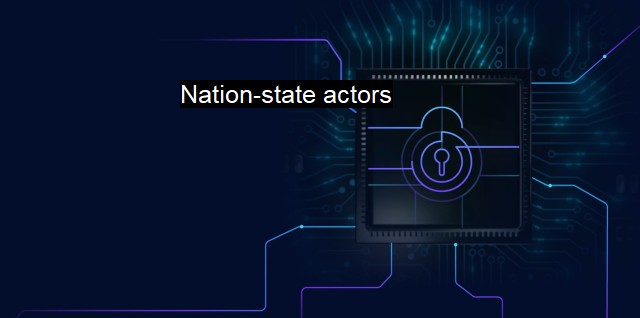What are Nation-state actors?
Nation-State Actors: The Highly Sophisticated and Capable Hackers in Cyberspace Ecosystem Exposing There Geostrategic and Clandestine Operations
Nation-state actors in cybersecurity refer to a group of sophisticated & highly skilled hackers, or sometimes hacking groups, funded and backed by governments of specific countries. They're organized and structured like private companies, but the main difference is that the authority directing their efforts is a government agency instead. These groups of software specialists go by different names; for instance, they are often referred to as advanced persistent threats (APTs), because their actions generally involve high degree of threat with long-term implications. They are believed to be motivated by political, economic, technical or military agendas.Nation-state actors are unarguably the most advanced and experienced hackers in the world, capable of developing and implementing complex exploit chains and abuse systems that challenge even the most sophisticated defenses. They command vast resources and networks to detect vulnerabilities in systems, thanks to the significant financial support they receive from their governments. Nation-state actors operate indiscriminately, targeting both private and public sectors with their cyberattacks for varying reasons and agendas.
One of their trademark cyber operations is advanced espionage; spying on countries, corporations, or individuals of interest to gain sensitive information. This could be classified national security information, intellectual property, key commercial information, or other data valuable in the geopolitical landscape. The breaches are often long-term and stealthy - sometimes, the incident may only be detected years after initial compromise.
Nation-state actors exhibit versatility in their approach to cyberattacks. From misdirection to evasion, their tactics, techniques, and procedures (TTPs) can evade traditional antivirus and even advanced threat detection systems. They are known to use supply chain attacks, in which they compromise a low-security target related (either directly or indirectly) to the main target to gain access. They may also use zero-day attacks, sophisticated malware, ransomware, or Distributed Denial of Service (DDoS) attacks among others.
These actors also employ social engineering techniques to manipulate individuals into breaking security procedures and revealing sensitive information. These efforts often take the form of phishing emails, which may appear legitimate, but they're designed to mislead recipients into providing crucial information, granting access rights, or opening attachments infected with malware.
Nation-state actors are not primarily driven by financial benefits, as in the case with cybercriminals. Their chief objectives revolve around weakening their adversaries (whether countries or organizations), advancing their national security interests, disrupting the adversary's critical infrastructure, or gaining a strategic edge with information. It's no wonder that these group are considered some of the most dangerous threats in cybersecurity.
Defending against nation-state actors requires a robust, evolving cybersecurity policy and strategy: offensive and defensive. Organizations must take a proactive stance, investing in advanced threat detection and risk analysis software to monitor network activity and identify irregularities early. Governments must also incorporate these hackers' tactics and facilitate information sharing to better prepare for such attacks. Incorporating artificial intelligence and machine learning can enhance the ability of systems to detect and respond to these complex attacks. Regular staff training on identifying and handling potential threats could also prove beneficial.
The cybersecurity landscape is ever shifting, and the rise of nation-state actors threatens to disrupt even the most highly protected of establishments. This calls for constant vigilance and a forward-looking strategy built on intelligent systems, analysis based response and broad-based cooperative endeavours between organizations and governments globally. The clear understanding of the nation-state actor goes a long way in defending and protecting one's information and infrastructure from this sophisticated adversary in the cyber world.

Nation-state actors FAQs
What are nation-state actors in the context of cybersecurity and antivirus?
Nation-state actors refer to government-sponsored individuals or entities that engage in cyber espionage or cyberwarfare against another country, organization or individual. These actors are often highly skilled and well-resourced and can carry out sophisticated attacks aimed at stealing sensitive data or disrupting critical infrastructure.What motivates nation-state actors to carry out cyber attacks?
Nation-state actors carry out cyber attacks for a range of reasons, including political, economic, or military gain. They may seek to steal valuable intellectual property or sensitive government or military information, disrupt critical infrastructure or services, or gain an advantage in diplomatic or military negotiations.How can organizations protect themselves against nation-state cyber attacks?
Organizations can take several steps to protect themselves against nation-state cyber attacks, including implementing strict security policies and procedures, regularly updating software and systems, monitoring network traffic for suspicious activity, and conducting regular security audits and assessments. It is also important to train employees on cybersecurity best practices and to have a response plan in place in the event of a cyber attack.What role do antivirus and cybersecurity software play in defending against nation-state actors?
Antivirus and cybersecurity software can play a critical role in defending against nation-state actors by detecting and blocking malicious code or suspicious network activity. Quality software can also help organizations identify vulnerabilities in their network and provide recommendations for remediation. However, it is important to note that nation-state actors are often highly skilled and sophisticated, and can evade detection by traditional cybersecurity measures. Therefore, a holistic approach to cybersecurity, including employee training and regular security audits, is necessary to protect against these threats.| | A | | | B | | | C | | | D | | | E | | | F | | | G | | | H | | | I | | | J | | | K | | | L | | | M | |
| | N | | | O | | | P | | | Q | | | R | | | S | | | T | | | U | | | V | | | W | | | X | | | Y | | | Z | |
| | 1 | | | 2 | | | 3 | | | 4 | | | 7 | | | 8 | | |||||||